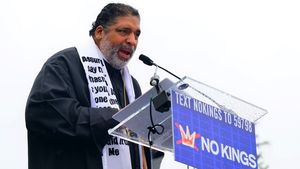The outbreak in a Scott County, Indiana, has public health experts searching for ways to spot the next big outbreak – and prevent it from happening in the first place, according to the Indy Star. The outbreak – with nearly 160 reported new infections so far – is the worst HIV outbreak in Indiana history, with Governor Mike Pence declaring a public health emergency until May 2016. In addition, a needle exchange program created to combat the outbreak will continue, despite Indiana's ban on needle exchange programs (which some say helped lead to the outbreak in the first place).
The outbreak is raising alarms for public health officials both in the state of Indiana and the nation at large, as this outbreak is among injection drug users, a demographic that accounts for about 10 percent of all new HIV infections a year. Also worrisome, is the outbreak occurred in a small rural community of less than 5,000 people who had limited access to health services and HIV testing.
Despite assistance from the Centers for Disease Control and Prevention, and AIDS Healthcare Foundation and other nonprofits, the small community is overwhelmed. In addition to the nearly half a million already spent this year on HIV prevention, experts estimate that the outbreak will cost the state of Indiana roughly $500,000 per patient to cover just the medical cost of treating HIV.
"It's an extremely expensive situation for our state government and local government. An HIV patient lives on an average 25 years, so there's about a half million dollars of cost related to their healthcare," Dr. Kevin Burke, the medical director of Indiana's southeast region AIDS/STD testing and detection center, told WTHR. "And many of them will end up living on public assistance and welfare, and that takes about $400,000 to $500,000 to support them for 25 years. So you're looking at a cost to the state of just under a million." (That's a million dollars for each person.)
The outbreak in Indiana is indicative of a larger problem facing public health experts. A perfect storm of poverty, prescription medications, and lack of health services made the small county ripe for infection of not only HIV, but hepatitis C.
“We saw this coming a long time ago,” William Cooke, the only doctor in the epicenter of the outbreak, Austin, told the Washington Post. “There’s a lot of poverty and very few resources available to the community. We’ve been asking for help for some time.”
Cooke told reporters that he’d noticed an increase in prescription opiod use and overdoses in his family practice that tipped him off to a problem brewing.
Statistics show a strong correlation between opiod use and hepatitis C infections, which experts take as possible signs of HIV infections. Since the outbreak, experts have flagged six other Indiana counties – Hendricks, Parke, Starke, Fayett, Wayne and Henry – that may be the sites of future outbreaks based on their rate of opiod use, hepatitis C infections among injection drug users, and overdose mortality rates.
And while HIV treatment centers have popped up to combat the disease in Austin, many drug users are hesitant to use them because of stigma and misinformation associated with HIV.
“There are still a significant proportion of people in Austin who have biases about HIV and are contributing to the stigma and subsequent fear,” said Dr. Diane Janowicz, an infectious disease specialist at Indiana University, to the New York Times. “I have to reassure them: If your grandkid wants a sip of your drink, you can share it. It’s okay to eat at the same table. You can use the same bathroom.”
Needle exchanges are helping but drug users must also register and carry an ID card with their birth date and a few letters of their name in order to possess clean needles. Anyone with needles but no card can be arrested. Proponents of the arrests claim it will prod more people into registering, but researchers say that registering users may be hampering the programs efficacy.



































































